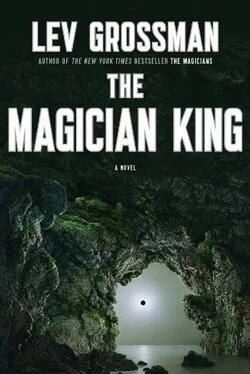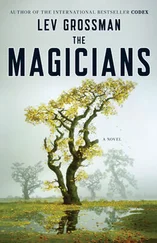Quentin considered this.
“I do. But it’s not about the money.”
“What’s it about then?”
“It’s about observing good form,” Quentin said. “You of all people know all about that.”
Eliot sighed.
“I suppose I can see that,” he said.
“And I need this. That’s all I can tell you.”
Eliot nodded. “I can see that too.”
Contestants began trickling into the city a few days later. They were a bizarre menagerie: men and women, tall and short, haunted and feral, scarred and branded and shaved and tattooed. There was an ambulatory skeleton and an animated suit of armor. They carried swords that glowed and buzzed and burned and sang. A handsome pair of conjoined twins offered to enter individually and, in the event that they vanquished the field, gallantly declared themselves willing to fight each other. An intelligent sword arrived, borne on a silk pillow, and explained that it wished to enter, it merely required somebody willing to wield it.
On the first day of the tournament there were so many pairings that some of the bouts had to be held outside after all, on wooden stages set up in the courtyards. A circus atmosphere prevailed. The weather was just turning — it was the first cold morning of the year — and the fighters’ breath smoked in the dawn air. They performed all kinds of weird stretches and warm-ups on the wet grass.
It was everything Quentin had hoped for. He couldn’t sit still long enough to watch a whole match, there was always something unmissable going on in the next ring over. Shouts and clashes and weird war cries and even less easily identifiable noises broke the early morning calm. It was like being in a battle, but minus all the death and suffering.
It was three full days before the contestants worked their way through the draw to the final pairing. There were a few incidents and explosions along the way, where forbidden weaponry or major magic overpowered the safeguards they’d put in place, but no one was hurt too badly, thank God. Before it started he’d had a romantic idea about entering the tournament himself in disguise, but he could see now what a disaster that would have been. He wouldn’t have lasted thirty seconds.
Quentin oversaw the final match himself. Eliot and Janet condescended to attend, though such grunting, sweaty exercises were beneath Queen Julia’s notice. Various barons and other court grandees and hangers-on sat in a row against the walls of the banquet hall, which looked woefully unmartial — he wished he’d done it outside after all. The last two fighters entered together, side by side but not speaking.
After all that they looked oddly alike: a man and a woman, both slender, both of average height, nothing outwardly extraordinary about either of them. They were cool and serious, and they showed no obvious animosity for each other. They were professionals, drawn from the upper tiers of the mercenaries’ guild. They were just here to transact business. Whatever violence they had stored up in their lean, compact bodies was still latent for the time being, fissile but inactive. The woman was called Aral. The man’s name, absurdly enough, was Bingle.
Aral fought veiled and tightly swathed, like a ninja. She had a reputation as an elegant fighter who made a fetish of her technique. Nobody had been able to break her form, let alone touch her. Her sword was an oddity: it was curved slightly and then recurved, in the form of an elongated letter S . Pretty but a pain to carry around, Quentin thought. You couldn’t fit it in a scabbard.
Bingle was an olive-colored man with hooded eyes that gave him a permanently melancholy look. He wore what might once have been an officer’s uniform from which the bars and trim had been snipped, and he fought with a thin, flexible, whiplike blade with a complicated basket hilt that didn’t look Fillorian. Though he’d won all his matches, the buzz on him was that he’d managed it without doing a lot of actual fighting. One infamous duel started in the morning and ran almost till sundown while Bingle engaged in an endless series of feints and evasions. The whole tournament was held up while they waited for the bracket to be filled.
In another match Bingle’s opponent waited till the opening bell had rung and then calmly stepped over the chalk line out of bounds for an automatic forfeit. Apparently they’d met before, and once had been enough. Quentin was looking forward to watching somebody make Bingle actually stand and fight.
Quentin nodded to the Master of Sword to start the match. Aral began a sequence of highly stylized movements, drawing fluid shapes in the air with her recurved blade. She didn’t approach her opponent. She seemed to be lost in concentration, practicing some ritualized, almost abstract martial art. Bingle watched her for a little bit, flicking the tip of his sword around uneasily.
Then he joined the dance. He began performing the same movements as his opponent — they became mirror images of each other. Apparently they were adepts of the same style and had chosen to open with the same form. Laughter rippled through the crowd. And it was funny, like a mime copying a passerby. But neither of the fighters laughed.
Afterward Quentin wasn’t sure exactly when this preamble ended and the fighting began. The two combatants passed too near each other, and it was like a candle flame accidentally brushing a curtain. A spark jumped the gap, the symmetry was broken, the fissile material reached criticality, and suddenly the room was full of the rapid-fire clatter of steel colliding with steel.
At this level of mastery the action went too fast for Quentin to follow. The precise details of the moves and countermoves and negotiations were lost on everybody but the combatants. Their shared style was all arcs and spins and constant motion as each side looked for openings and found only dead ends. You got the impression they were reading each other down to an atomic level, logging tiny twitches and tells and shifts of weight. The passes would start beautifully, set sequences that sometimes even included a flip or a somersault, then the flow would break and everything would be chaos until the blades tangled up and locked, and they disengaged and started all over again.
Jesus, Quentin thought. And he was going to get on a boat with one of these people. It was a little too real. But it was electrifying too: these were people who knew exactly what they were meant to do and never hesitated to do it, whether they won or lost.
Then all at once it was over: Aral overextended herself with a huge overhand chop that Bingle just managed to roll out from under, and by blind chance her blade stuck fast in the floor, in a crack between two flagstones. Coming up out of the roll Bingle kicked at it, reflexively, and it snapped neatly halfway along its length. Aral stepped back, not bothering to conceal her frustration, and indicated that she conceded the match.
But Bingle shook his head. Apparently he wasn’t happy with the grounds of his victory. He wanted to keep fighting. He looked at Quentin for a ruling. So did everybody else.
Well, if he wanted to play by good-guy rules, then by all means. Quentin wouldn’t mind seeing some more fighting himself. He drew his sword and offered it to Aral hilt-first. She felt the balance, nodded grudgingly, then resumed her fighting stance. The match recommenced.
Five minutes later Bingle jumped a low cut and attempted some midair finesse move that got tangled up in Aral’s ninja wrappings. He wound up right next to her, inside her guard, and she punched him savagely in the ribs, three times. He grunted and staggered backward toward the chalk line, and Quentin was sure he was going to ring out, but at the last second he realized where he was. He spun around and leaped balletically for the wall, pushed off it, turned head over heels, and landed lightly on his feet just in bounds.
Читать дальше












